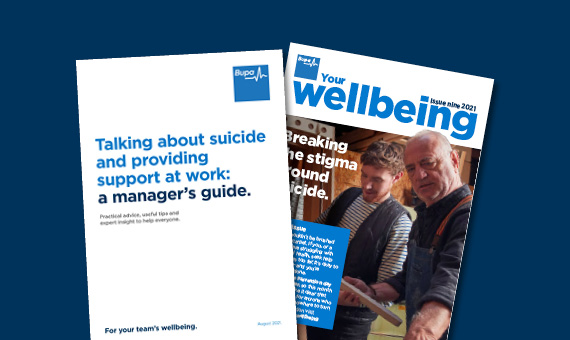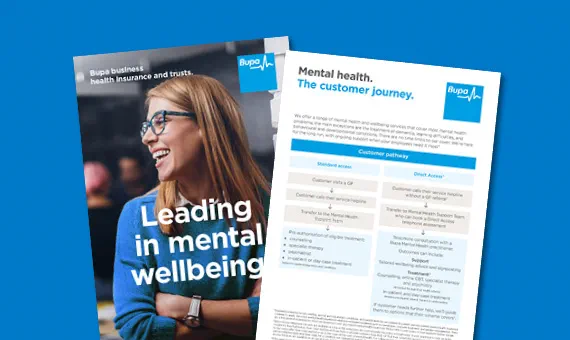Messages that work for men
Opening up about men's health
Awareness and attitudes around men's health is improving — helped by a growing number of celebrities, sports stars and everyday heroes talking more openly about their own health and wellbeing.
When successful sportsmen such as cricketer Ben Stokes1, and Olympic swimmer, Adam Peaty2, announced they were taking time out of their schedules to protect their mental wellbeing, it challenges the myth that poor mental health is sign of weakness.
There's more to do
But there is still a long way to go, as Peaty pointed out on social media, “Reading some of the comments in response to this [Peaty's announcement that he was taking a break] is why we have such a stigma around mental wellbeing in sport.”3
And there is no denying that we face an ongoing crisis around men's mental health, in particular.

Suicide
The statistics are shocking:4
- Men are three times more likely to take their own lives than women.
- Men aged 40 to 49 have the highest suicide rates in the UK.
- One in eight men has a mental health problem such as depression, anxiety, panic disorder or obsessive compulsive disorder.
- Men are far less likely to access therapy - only 36% of NHS referrals for talking therapies are made for men.
In 2019, the suicide rate in men was the highest recorded since 2000,5 and while the pandemic has not led to any increase in these deaths,6 the picture is still uncertain as there is evidence of rising mental distress, particularly among younger people.7
Trauma
And the pandemic has undoubtedly been traumatic, although trauma is a more subtle concept than we often realise. David Trickey a consultant psychologist and Co-Director of the UK Trauma Council explains that stress can turn into trauma when there is a disconnect in "meaning-making" and "the way you see yourself, the way you see the world, and the way you see other people" is overturned, by a stressful event — such as the pandemic. This disruption in our ability to make sense of events can spiral into trauma.8
For men, this sense of powerlessness associated with the pandemic might present additional challenges around gender-based perceptions and the need to be 'strong' and 'in control'.
These gender stereotypes also deter men from seeking help. There is still a misconception that poor mental health is 'incompatible' with traditional perceptions of masculinity, and that conditions such as depression, which impact emotional wellbeing, are intrinsically feminine.9
Action
Language, and the way mental health messages are communicated to men can break down many of the barriers around seeking help. Bupa Behavioural Insights Adviser Lauren Gordon explains, "We advise identifying what might be stopping your audience from asking for help and tailoring the messaging accordingly.
“One barrier to using an employee assistance programme (EAP) is the concern that the information will be shared with the employer — this can be easily addressed in messaging, by highlighting that the service is confidential. Ease of access is also crucial. Making it really clear how to access the service can reduce any uncertainty and encourage people to seek help.”
Lauren suggests, “Think about who your messages are for. Studies show that men prefer a solution-focused approach when it comes to seeking help for mental health.10
"Framing the messaging to motivate change, addressing stereotypes and incorporating content that highlights positive traits — such as taking action, responsibility and strength— will resonate better."
"Where possible, it is best to test any tailored communications first, with a small group of the target audience, to make sure it lands as anticipated.”
Delivering a tailored messaging at the right moment can also prompt action. In an office, placing information about how to access support in places where staff might take a break can provide a timely reminder. For example, leaflets and motivational stickers by the tea and coffee making facilities, or posters in a private places such as bathroom cubicles.
"For a large organisation with large numbers of male employees on the road, we successfully encouraged more men to seek help using tailored stickers on their vehicle dashboards”, Lauren says.
Every workplace is unique, so carefully considering whether the message is right for the audience and how it's addressing their specific barriers can help.
Did you know 75% of all suicides are men?
This video helps you to understand some of the factors that may lead to suicidal thoughts and looks at how Bupa can help.
Watch the video here1 00:00:00,720 --> 00:00:02,940 Let's talk about suicide prevention.
2 00:00:03,480 --> 00:00:10,080 Did you know that 75% of all suicides are men with 45 to 49 year olds
3 00:00:10,140 --> 00:00:11,870 being the most affected age group? ,
4 00:00:12,350 --> 00:00:16,160 Our research suggests that there are some common factors driving this,
5 00:00:16,190 --> 00:00:21,160 which can cause depression, anxiety and ultimately lead to suicidal thoughts.
6 00:00:21,520 --> 00:00:26,200 Men are much more likely to cite money problems and career stress as
7 00:00:26,200 --> 00:00:28,360 a cause of their suicidal thoughts.
8 00:00:28,660 --> 00:00:32,380 Deep down, many men still feel responsible for providing for their
9 00:00:32,380 --> 00:00:36,670 family and being unable to support them can cause feelings of shame.
10 00:00:37,240 --> 00:00:41,470 Alcohol addiction and substance abuse are also very common factors
11 00:00:41,470 --> 00:00:45,519 for declining mental health with men more likely to talk about addiction
12 00:00:45,850 --> 00:00:47,920 as a driver for suicidal thoughts.
13 00:00:48,660 --> 00:00:51,240 For men, age is more than just a number.
14 00:00:51,540 --> 00:00:55,560 Many men get depressed by their deteriorating physical health as they age.
15 00:00:55,980 --> 00:01:00,690 And this sometimes gets less focused and is often dismissed as a midlife crisis.
16 00:01:01,350 --> 00:01:05,280 The breakdown of relationships can also contribute and it's no
17 00:01:05,280 --> 00:01:10,620 coincidence that 45 to 49 is also the most common age for divorce.
18 00:01:11,054 --> 00:01:14,865 Men talk about seeking help, where conversations around depression and
19 00:01:14,865 --> 00:01:19,445 suicide are concerned, but far less men typically visit the doctor to
20 00:01:19,445 --> 00:01:21,155 discuss their thoughts and feelings.
21 00:01:21,479 --> 00:01:25,039 We offer a range of services that you can access remotely without the
22 00:01:25,039 --> 00:01:29,240 need to leave your home if you find visiting the GP a challenge, if
23 00:01:29,240 --> 00:01:33,050 you or a loved one are struggling with depression and experiencing
24 00:01:33,050 --> 00:01:34,710 thoughts of a suicidal nature,
25 00:01:34,990 --> 00:01:35,899 don't go it alone.
26 00:01:36,320 --> 00:01:40,339 Our trained mental health advisors are here to help kickstart a conversation
27 00:01:40,369 --> 00:01:44,400 easily and discreetly and provide the help and guidance you need to
28 00:01:44,400 --> 00:01:46,070 tackle any mental health issues.
29 00:01:46,520 --> 00:01:49,070 Think Bupa whenever you have a health concern.
30 00:01:49,520 --> 00:01:51,860 Whatever's on your mind, it's normal to us.
31 00:01:53,510 --> 00:01:57,470 If you feel that your mental health is in a crisis or that you just need
32 00:01:57,470 --> 00:02:02,180 advice and guidance, don't hesitate to explore the helpful organizations you
33 00:02:02,180 --> 00:02:04,610 can turn to for mental health support.
Resources to support you
Organisations can access various men's health and suicide employee engagement materials:

Intermediaries can check out our Mental Health Toolkit for use with your clients:
Business Mental Health Advantage
Employee poster (PDF 1MB)Leaflet (PDF 1.7MB)
Brochure (PDF 1.6MB)

2 https://www.bbc.com/sport/olympics/58052874
4 https://www.mentalhealth.org.uk/a-to-z/m/men-and-mental-health
5 https://www.theguardian.com/society/2020/sep/01/male-suicide-rate-england-wales-covid-19
6 https://www.thelancet.com/journals/lanepe/article/PIIS2666-7762(21)00087-9/fulltext
7 https://bmjopen.bmj.com/content/10/9/e040620
8 https://www.bbc.com/future/article/20210203-after-the-covid-19-pandemic-how-will-we-heal
9 https://www.frontiersin.org/articles/10.3389/fpsyt.2020.599039/full
10 https://journals.sagepub.com/doi/pdf/10.1177/1557988319857009
Bupa health insurance is provided by Bupa Insurance Limited. Registered in England and Wales No. 3956433. Bupa Insurance Limited is authorised by the Prudential Regulation Authority and regulated by the Financial Conduct Authority and the Prudential Regulation Authority. Arranged and administered by Bupa Insurance Services Limited, which is authorised and regulated by the Financial Conduct Authority. Registered in England and Wales No. 3829851. Registered office: 1 Angel Court, London EC2R 7HJ
Bupa Health Trusts are administered by Bupa Insurance Services Limited. Registered in England and Wales No. 3829851. Registered office: 1 Angel Court, London EC2R 7HJ © Bupa 2025


